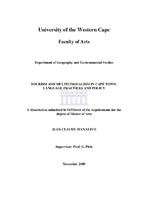| dc.description.abstract | Language diversity continues to create a language barrier to international tourism. Tourists from non-English speaking countries face a language barrier in South Africa and this affects their experiences in the country. Measuring and understanding something of this challenge is the purpose of this study. The focus is on how the tourism industry in Cape Town uses languages to sell and promote the city internationally. The study investigates procedures, strategies, and policies adopted by the tourism industry in Cape Town to cater for tourists from across the world. In addition, the study also investigates how tourists from non-English speaking countries adapt linguistically to cope with their stay in Cape Town. The study targeted both tourism organisations and international tourists who use tourist facilities in most popular tourist areas in Cape Town. Both primary and secondary data were collected. Convenience sampling was used to select both tourism service providers and tourists. To enhance validity, reliability, and accuracy, various tools have been deployed to collect the data. Primary data were collected from both tourism service providers and international tourists using questionnaires, interviews, photographs and observations. Secondary data collection involved observations of public signage as well as analysis of electronic and printed promotional materials such as brochures, guidebooks, menus, newspapers and websites. Collected data were captured in spread sheets to enable descriptive analysis of tourists’ languages and of language use in tourism organisations in different of forms of niche tourism in Cape Town. Survey results reveal that a little more than half of all surveyed tourism organisations in Cape Town sell and promote their products using only South African languages including English whilst a minority sell and promote their products using English coupled with foreign languages. The majority of multilingual staff in those surveyed tourism organisations who have adopted multilingualism are working part-time or employed temporarily. In addition, results also indicate that English dominates other languages in public signs and printed and electronic promotional publications used by surveyed tourism organisations in Cape Town. Foreign languages are used most in tour operations and travel agencies sector whilst South African languages dominate in accommodation and restaurants sectors. On the other hand the research shows that a big proportion of foreign tourists in Cape Town were able to speak English and other foreign languages. The research shows that the majority of tourists from non-English speaking countries are more interested in learning foreign languages compared with their counterparts from English speaking countries. Only less than a quarter of all surveyed tourists from non-English speaking countries in Cape Town are monolingual in their home languages. These tourists struggle to communicate with service providers in Cape Town. Translators and gestures were used by non-English speaking tourists as a way of breaking down communication barriers in Cape Town. Contrarily, a big proportion (two thirds) of all surveyed tourists from English speaking countries in Cape Town does speak only English. Foreign tourists in Cape Town speak tourism service providers’ language rather than tourism service providers speaking tourists’ languages. The majority of tourism service providers in Cape Town are reluctant to learn foreign languages and to employ multilingual staff. This means that most tourism organisations sell and market their product in English only. Other South African languages such as Afrikaans and Xhosa are used frequently in informal communication in the ourism industry in Cape Town. Seemingly, Afrikaans dominates Xhosa in all forms of tourism except in township tourism where the majority of service providers are Xhosa-speakers. To market and promote Cape Town internationally, the tourism industry in Cape Town should employ multilingual staff who can communicate in tourists’ native languages. Multilingualism should be practised in all tourism sectors rather than in one or few sectors because all tourism sectors compliment each other in meeting customer’s satisfaction. Failure in one tourism sector may affect other tourism sectors’ performance. | en_US |

